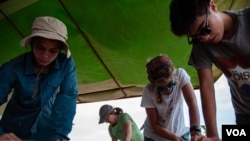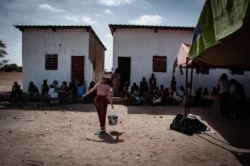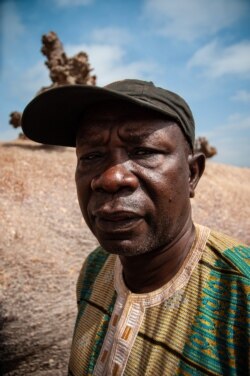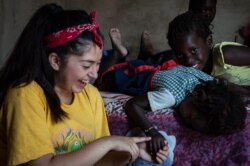The roar of power drills fills the air in the village of Guedj Martin, a typically quiet community of 2,000 people located some 100 kilometers (62 miles) from the Senegalese capital of Dakar. It's an unusual sound to hear in a village with no electricity, but the noise is a welcome disruption.
A group of 13 students and five chaperones from Lick-Wilmerding High School in San Francisco has spent the last two weeks building a primary school that will serve Guedj Martin and its neighboring villages. They're covered in dirt, dust and sweat, and blue and yellow paint is splattered on their clothes and shoes.
Jacques Cusin, the group's coordinator and a retired school administrator, has been organizing service trips to Senegal since 2006. He's facilitated the construction of three schools, a health clinic and other development projects such as adding bathrooms and gardens to existing schools. Each year he brings with him a variety of construction materials, including portable batteries for the power tools.
"When you visit these schools in the villages, you see how eager the kids are at learning anything really," he said.
Employment opportunities
Cusin said the projects also have provided jobs. Each school employs four or five teachers, plus a principle whose salaries are funded by the government. The projects also provide employment to local masons whom Cusin hires to construct the foundation, walls and roofs of the buildings.
"They are a source of capital for the village because those villages have very little opportunities for a cash economy," he said.
The students are tasked with designing the blueprint for the school, as well as painting and building desks and benches. They pay for their own travel and accommodation expenses while Cusin's network of friends from San Francisco provide funding for construction costs.
Moustapha Niane, a school inspector for Senegal's Ministry of Education, said the schools Cusin has worked on have had a major impact on quality and access to education.
The number of students passing their end-of-year exams has risen dramatically, he said.
"All the conditions are met so that students can succeed," he said. "It's allowed students who maybe didn't have the chance or who had to travel great distances to go to school. And that's really something."
In Guedj Martin, many children don't receive a primary education because the nearest public school is two kilometers away — too far for young children to walk, said Sitor Diouf, the village chief.
The hot Senegalese sun makes matters worse, he said, so many children end up waiting until they're older to go to school.
Even the nearest private school is one-and-a-half kilometers away, which is still too far for young children, Diouf said. And the families who used to be able to pay tuition can no longer afford do so because of a years-long drought.
'It's for eternity'
When the villagers heard they would be receiving a new public school, everyone applauded, Diouf said.
"A school in a village, it's not for two days, it's not for three days — it's for eternity," he said. "It's something [the villagers] have wished for and needed for a long time that they were never before able to have."
The new school will allow for the development of young citizens who will be well-equipped to change their village and their country for the better, Diouf said.
"The villagers are very happy that these American students came to work on the school," he said. "Really, it's huge."
The experience has been positive for the American students, as well. In addition to building the school, Teresa Topete, a rising junior at Lick-Wilmerding, has been helping Cusin's wife, who is a gynecologist, provide basic health care to the villagers.
Seeing how appreciative the villagers are for the few resources they have has made her realize how much she takes for granted, she said. Many of the village women are in pain from years of carrying heavy loads on their heads and children on their backs, along with giving birth to numerous children. Yet many have never taken medication or even seen a pill before.
"They kind of just have to push through all this pain and they're not really supposed to talk about it," she said. "Their ability to stay happy or really joyous and community-oriented through all their struggles has been really eye-opening."
The school is set to open in October, and Cusin plans to bring a new batch of American students next summer to the same school to work on beautification projects.



